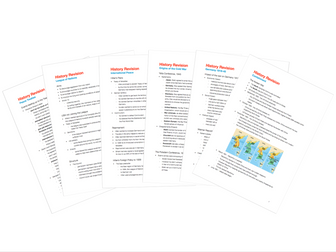CAMBRIDGE IGCSE History - Containment of Communism 1950-70 notes
<p>Detailed Cambridge IGCSE History notes on USA’s containment of Communism, including:<br />
• Events of the Cold War<br />
• Case studies of:<br />
– American reactions to the Cuban revolution, including the missile crisis and its aftermath<br />
– American involvement in the Vietnam War, e.g. reasons for involvement, tactics/strategy, reasons for withdrawal<br />
– American reactions to North Korea’s invasion of South Korea, involvement of the UN, course of the war to 1953</p>
<p>Option B<br />
The 20th century: International Relations since 1919<br />
• How effectively did the USA contain the spread of Communism?</p>
